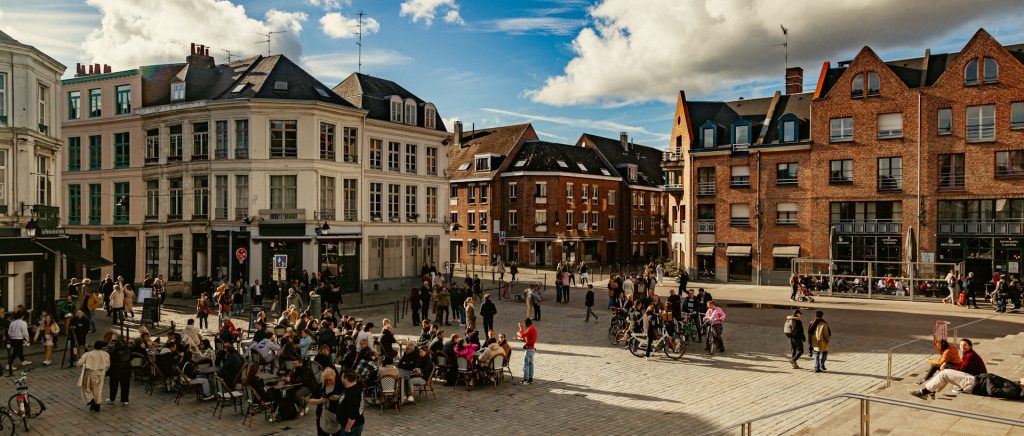Housing rights: Metropolis of Lille’s challenges and solutions
The European Metropolis of Lille is calling for strong action to develop affordable housing without compromising the environmental commitments
The European Metropolis of Lille needs to address a high demand for housing, 6,200 dwellings per year, in a very large area (672km2) that includes urban centres and rural municipalities. Access to housing is very difficult for intermediate and low-income households. It is therefore essential to find solutions for (very) affordable housing.
We spoke with Anne Voituriez, Vice President for Housing and Accommodation of the European Metropolis of Lille, to understand how this Energy Cities member is tackling the challenge and what expectations they have at the European level.
What are the current housing needs in the European Metropolis of Lille?
We estimated that 6,200 new units per year are needed for the duration of the new Local Housing Plan (2022-2028). However, the real estate crisis has led to a significant decline in building permits, which fell by 30% in 2024 compared to 2023. This drastic drop in overall housing production has had a severe impact on social housing development, with permit approvals reaching only half of the targeted 2,300 units per year for the past two years. The high cost of land and rising construction costs have further exacerbated the crisis, making it increasingly difficult to balance construction projects financially.

How is the European Metropolis of Lille responding to this housing crisis?
The European Metropolis of Lille (MEL) is implementing multiple strategies to support housing construction. In 2024 alone, more than €9 million has been allocated to support new construction and €5 million for the renovation of social housing.
Providing housing for the most disadvantaged remains a key political priority, accounting for more than half of the total budget. However, social rental housing under the Social Rental Loan (the French scheme PLUS to support social housing for low to middle income beneficiaries) scheme is also receiving €2 million in support, with the introduction of special grants to balance more complex and costly operations.
Homeownership support has not been overlooked either, with nearly €2 million allocated to finance projects under the PSLA (French home-ownership scheme that enables households with limited resources to become the owner of their main home at a regulated price, with the status of a first-time tenant) and BRS (French community land trust) schemes. These initiatives enable middle-class families to purchase homes at maximum prices of €2,900 per square meter—significantly lower than the average price of new housing in the metropolis, which currently stands at around €4,500 per square meter.
In addition to the urgent need for housing, there is also an ecological imperative. France is one of the few countries that have implemented binding regulations to limit land take and to integrate energy sufficiency into its national strategy. How do you incorporate net zero land take and energy sufficiency into the Metropolis’ housing policies?
Net Zero land take and urban renewal are central to the European Metropolis of Lille’s urban planning strategy. This focus stems from the region’s unique landscape, which includes numerous industrial brownfields that have been gradually redeveloped since the late 1990s. Today, these principles are enshrined in law and embedded in our regulatory framework, including the Local Urban Plan. Over the next ten years, we have identified 400 hectares of available land for housing development.
This challenge is even greater for our region, as 29 of our municipalities are deisignated as “water conservation areas”, where we must protect groundwater resources. In these areas, urban expansion is already prohibited. As a result, urban renewal projects are essential—but they are also more expensive and time-consuming. That is why we have implemented a range of measures to support developers, from facilitating complex projects to a land policy that allows MEL to hold land under a lease, enabling property developers to focus their financial resources on project development.
We now have a European Commissioner, Dan J⌀rgensen, responsible for both energy and, for the first time, housing. He has been tasked with drafting a plan for affordable and sustainable housing. What messages would you like to convey to him?
In the MEL, we are seeing a growing number of households waiting for social housing. There is a clear disconnect between household incomes and housing costs, which has been widening since the early 2000s. Given that our region has a high proportion of low-income households, this issue is even more pressing for us.
Now that, for the first time, a European Commissioner is responsible for housing—and given that all stakeholders, from local authorities to businesses, are struggling to provide adequate housing—we need strong action to renovate existing housing stock and develop affordable housing. These essential actions are expensive and increasingly difficult to implement in a context of inflation, rising interest rates, and shrinking public funds.
I would therefore ask the Commissioner how we can work together to develop simple mechanisms to reduce construction costs and, ultimately, the financial burden on households—for example, by facilitating access to subsidised loans.
All actions that contribute to ensuring our citizens can access decent housing while meeting our environmental commitments are welcome. We have significant opportunities in areas such as repurposing vacant buildings, renovating existing housing, and supporting the development of homes targeted at middle-income families.
I sincerely hope that the European Union will adopt measures that help us implement an effective and sustainable housing policy!
Interested in learning more about the housing crisis in Europe? Discover the challenges Budapest, Utrecht and Verona are striving to tackle and read about the broader situation in different EU cities.

